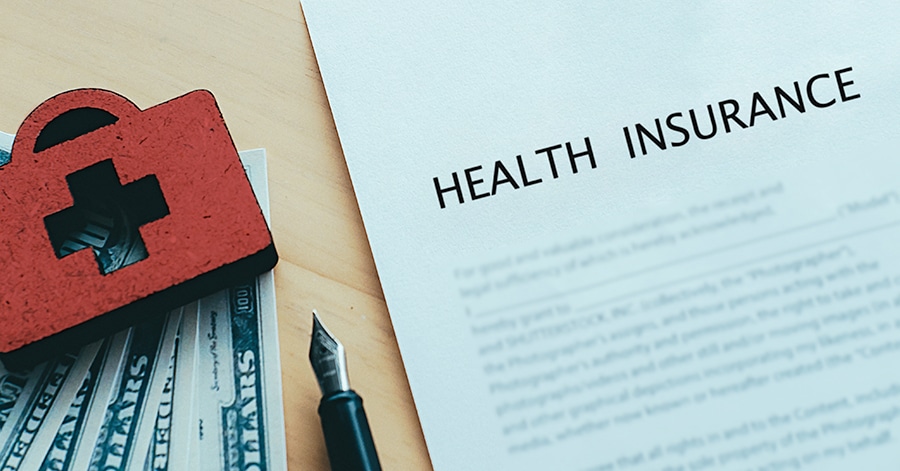How Do Health Insurance Deductibles Work?

You likely have a deductible if you have health insurance through your employer or the marketplace. It might even be a big number, like $2,500 or more. So your health insurance deductible is an important factor in your insurance coverage.
What are Health Insurance Deductibles?
A deductible is the amount you must cover before your health insurance pays for covered services. Each plan has a different deductible, and it resets each year.
Your health insurance deductible is directly related to your health insurance premiums. The higher the premiums you pay, the lower the deductible you’re responsible for, and vice versa. Taking a higher deductible takes on a larger part of the burden of handling your medical bills. This is a lower risk for insurance agencies, which allows them to give you lower premiums.
How Does a Deductible Work?
Health insurance deductibles are different on every policy. Some don’t have a deductible, meaning the insurance company pays for covered medical expenses immediately. Others have different deductibles for each medical cost category, and others have one flat deductible.
For example, if your insurance policy has a $2,000 deductible, you must cover the first $2,000 in medical expenses before your insurance company covers any portion of the bill.
Notice we said covered medical expenses. The payments won’t count toward your deductible if you have any medical bills that don’t fall under covered expenses. So you might pay more than the total deductible before your insurance starts paying.
Individual and Family Deductibles
Most insurance policies have an individual deductible and a family deductible. The individual deductible is how much each person must cover before the insurance company covers any medical expenses.
The family deductible applies to the entire family. So, for example, if you have a $1,000 individual deductible but a $3,000 family deductible, it means once you pay $3,000 for anyone in your family, the family deductible is met. The insurance company will cover future covered medical expenses at the promised percentage.
What is Coinsurance?
Coinsurance and deductibles often get confused. Once you meet your deductible, it doesn’t mean the insurance company will pay 100% of your medical costs.
They’ll pay the agreed-upon percentage stated in the policy. So, for example, if you have an 80/20 policy, the insurance company will pay 80% of covered expenses after your deductible, and your coinsurance is 20%.
So if you have a $1,000 medical bill and the insurance company considers all costs covered, they would pay $800, and you would pay $200.
Does Insurance Cover Anything Before the Deductible?
Many insurance companies cover certain medical expenses before the deductible. This is unlike most other insurance policies, so it’s important to understand.
For example, all marketplace insurance policies cover preventative medical costs before the deductible. So a physical, screening or immunization may be covered even if you haven’t paid your deductible yet.
Always discuss what services might be covered with your insurance provider.
What Happens if you Don’t Meet your Deductible?
If you don’t meet your deductible for the year, you pay the medical costs you incur out of pocket. Your deductible resets annually, so you’ll start fresh again the next year.
If you’ve met your deductible mid-year, taking care of any potential medical concerns is a good idea. At the same time, the insurance company will cover a larger portion of your medical expenses, if possible.
What Happens if you Reach your Deductible?
The insurance company starts paying some of your bills when you reach your deductible. But, as we said earlier, you will still be responsible for your coinsurance.
Each category may have a different coinsurance amount, so pay close attention. For example, you may have one coinsurance amount for regular healthcare needs and another for chiropractic care.
When you reach your deductible, the insurance company will cover some or all of your expenses for the remainder of the year.
Should you Have a High or Low Deductible?
Everyone wants to know the right deductible, but it’s not a one-size-fits-all answer. Whether you should have a high or low deductible depends on what you can afford.
For example, it’s pointless if you take an exceptionally high deductible to have lower monthly premiums but can’t afford your deductible.
Find the happy medium between paying your monthly premiums while leaving money to cover your medical expenses until you meet your deductible.
Families with few medical expenses regularly may take a chance and take the higher deductible to save money on their premiums. Still, families with many medical concerns and appointments may want a policy with a lower deductible to keep their out-of-pocket expenses lower.
Why are Health Insurance Deductibles Necessary?
It might seem frustrating to worry about paying your deductible, but health insurance companies have them to keep everything fair.
If health insurance companies had to cover all medical expenses, health insurance premiums would be higher across the board. However, it also gives consumers more options when choosing a plan, choosing the one that fits their budget the most.
Deductibles also make consumers think before they have medical procedures performed. If there wasn’t a deductible, more people would have elective procedures or would rush to the emergency room for things that might not be emergency room worthy.
Final Thoughts
Health insurance deductibles are a big part of your health insurance policy. Understanding how much you must pay before your insurance covers your bills is important. Weigh the pros and cons of taking on a higher or lower deductible and find the best policy that fits your monthly and long-term budget
